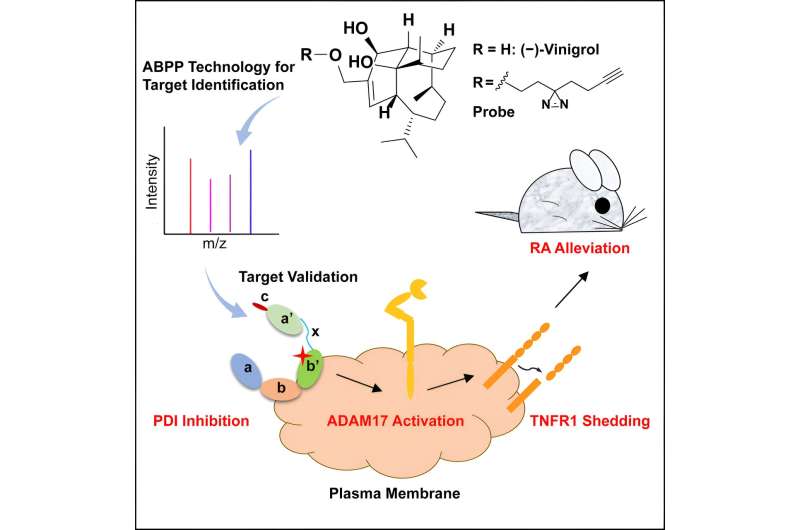This article has been reviewed according to Science X's editorial process and policies. Editors have highlighted the following attributes while ensuring the content's credibility:
fact-checked
peer-reviewed publication
trusted source
proofread
Vinigrol targets protein disulfide isomerase to block inflammatory response, shows study

Researchers led by Prof. Wang Lei from the Institute of Biophysics of the Chinese Academy of Science (CAS) and their collaborators have identified the direct target of vinigrol as protein disulfide isomerase (PDI) on the cell membrane. Vinigrol activates ADAM17 protease by inhibiting PDI, and then leads to the shedding of immune receptors TNFR1, thereby antagonizing the TNF-α signaling.
The study was published in Cell Chemical Biology on Oct. 31.
The natural product (–)-vinigrol has a wide range of biological activities, such as anti-hypertension, inhibiting platelet aggregation, etc. Vinigrol can antagonize tumor necrosis factor α (TNF-α) signaling.
Given the central role of the signal transduction pathway mediated by TNF-α and its receptor TNFR1 in the pathogenesis of autoimmune diseases, the development of novel potent and selective small molecule inhibitors of TNF-α signaling is important for the treatment of rheumatoid arthritis.
The research team designed and synthesized a bioactive photoaffinity small molecule probe, and combined it with activity-based protein profiling technology to find that PDI may be the protein target of vinigrol. It is worth noting that the physiological processes that PDI involved in (such as HIV invasion, platelet aggregation) are highly related to the biological activity of vinigrol.
The researchers subsequently conducted target verification and mechanism studies, showing that vinigrol binds to the b' domain of PDI and inhibits its various activities including reduction, oxidation, isomerization and molecular chaperone. At the cellular level, similar to reported PDI inhibitors and PDI antibodies, vinigrol can inhibit TNF-α-induced cell death, enhance the protease activity of ADAM17, and induce the cleavage of TNFR1.
In the collagen-induced rheumatoid arthritis mouse model, vinigrol can effectively reduce the arthritic score and joint damage by inducing TNFR1 shedding.
This study demonstrates that targeting the PDI-ADAM17 signaling module to regulate the shedding of cytokine receptors is a potential strategy for the treatment of autoimmune diseases, including rheumatoid arthritis.
More information: Yinhua Zhu et al, Photoaffinity labeling coupled with proteomics identify PDI-ADAM17 module is targeted by (−)-vinigrol to induce TNFR1 shedding and ameliorate rheumatoid arthritis in mice, Cell Chemical Biology (2023). DOI: 10.1016/j.chembiol.2023.10.003
Journal information: Cell Chemical Biology
Provided by Chinese Academy of Sciences





















